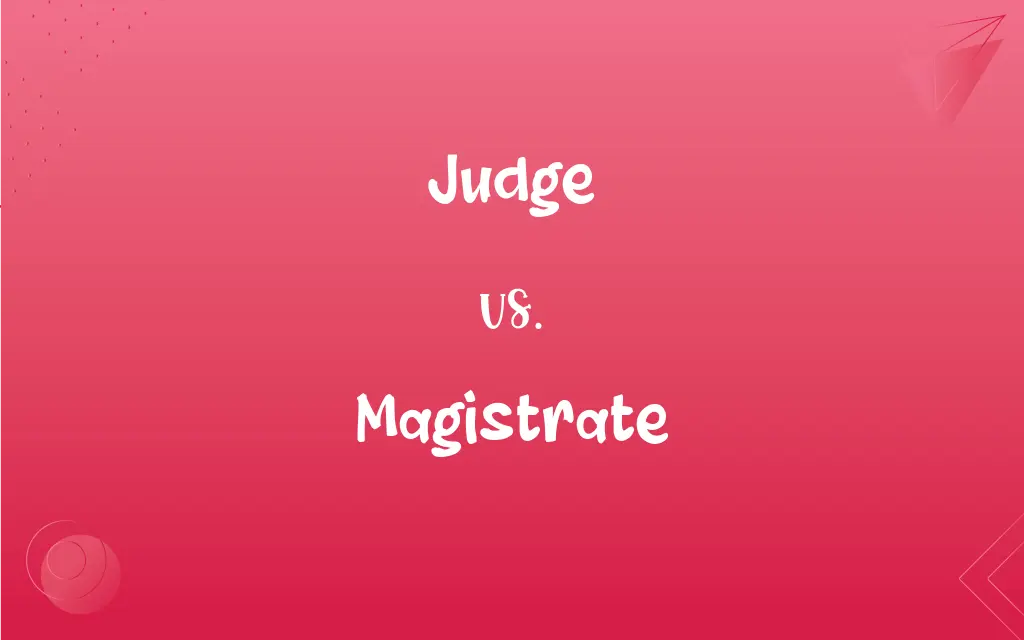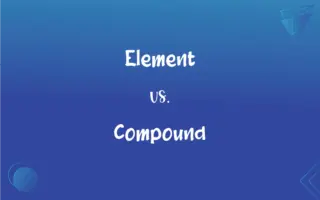Judge vs. Magistrate: What's the Difference?
Edited by Aimie Carlson || By Harlon Moss || Updated on October 16, 2023
A judge is often a higher-ranking judicial officer with general jurisdiction, while a magistrate handles minor legal matters and has limited jurisdiction.

Key Differences
A judge is a public officer appointed or elected to hear and decide legal matters in a court of law. They possess the authority to preside over trials, interpret laws, and render decisions. Judges often serve in various levels of the court system, from local to federal courts. In many jurisdictions, judges handle significant and complex legal cases.
A magistrate, on the other hand, typically deals with more specific or minor legal matters. They might oversee preliminary hearings, issue search warrants, or handle cases that don't require a jury trial. In some jurisdictions, magistrates assist judges by taking on a caseload of less severe issues, ensuring that the legal system can operate more efficiently.
While both judges and magistrates play crucial roles in the judicial system, their scope of authority and responsibility can differ significantly. For instance, while a judge might preside over a felony trial or handle high-profile civil lawsuits, a magistrate might manage traffic violations or minor disputes.
Furthermore, the process of becoming a judge often requires more rigorous qualifications and vetting compared to becoming a magistrate. Judges typically have more extensive legal experience and might have served as attorneys or legal scholars before ascending to the bench. In contrast, while many magistrates have legal backgrounds, some jurisdictions might appoint individuals with less formal legal education.
Despite these differences, both judges and magistrates are essential to ensuring justice. They work in tandem, each addressing different aspects of the legal process, to ensure that the legal system operates smoothly and fairly.
ADVERTISEMENT
Comparison Chart
Jurisdiction
General, often with authority over significant cases.
Limited, typically handling minor or specific legal matters.
Appointment/Election
Often elected or appointed for longer terms.
Might be appointed for shorter terms.
Qualifications
Typically require extensive legal experience.
Vary by jurisdiction; might not always need legal training.
Duties
Preside over trials, interpret laws, render decisions.
Oversee preliminary hearings, issue warrants, handle minor cases.
Level of Authority
Higher-ranking within the judicial system.
Lower-ranking with a narrower scope of authority.
ADVERTISEMENT
Judge and Magistrate Definitions
Judge
A person qualified to give an opinion or decide on the quality or worth of something.
She's a tough judge of character.
Magistrate
An official entrusted with administration of the laws.
The magistrate upheld the town's zoning regulations.
Judge
To determine a result in a competition.
He was chosen to judge the baking contest.
Magistrate
A minor judicial officer in some states with limited criminal jurisdiction.
For minor infractions, offenders might only have to appear before a magistrate.
Judge
A public official authorized to decide cases in a court of law.
The judge ruled in favor of the defendant.
Magistrate
A civil officer who administers the law, especially one with limited jurisdiction.
The magistrate issued a fine for the traffic violation.
Judge
To form an opinion or conclusion about.
We shouldn't judge others based on appearances.
Magistrate
A public officer usually in a city or town responsible for keeping the peace.
The magistrate ordered the noisy protesters to disperse.
Judge
To deem suitable or appropriate.
She judged it prudent to wait for backup.
Magistrate
A judge in a lower court.
The case was initially heard by a magistrate but later escalated to a higher court.
Judge
To form an opinion or estimation of after careful consideration
Judge heights.
Judging character.
Magistrate
A judge or justice of a local or inferior court; a justice of the peace.
Judge
(Law) To hear and decide on in a court of law
Judge a case.
Magistrate
A judge in a court having jurisdiction over the trial of misdemeanors and preliminary hearings involving felonies.
FAQs
Are judges impartial?
Judges are expected to be impartial and base decisions on the law, not personal beliefs.
Can judges serve in both civil and criminal courts?
Yes, judges can serve in both civil and criminal courts, depending on their jurisdiction.
Can a magistrate's decision be appealed?
Yes, decisions made by a magistrate can often be appealed to a higher court.
What is judicial discretion?
Judicial discretion refers to a judge's ability to make decisions based on personal judgment rather than strict rules.
What is a magistrate's main function?
A magistrate's main function is to handle minor legal matters and cases with limited jurisdiction.
How does one become a judge?
Judges are often elected or appointed and typically have extensive legal experience.
Are all magistrates legally trained?
While many magistrates have legal backgrounds, some jurisdictions might not require formal legal training.
Do magistrates conduct trials?
Magistrates can conduct trials, but these are usually for less severe issues or cases without a jury.
How are judges and magistrates held accountable?
Judges and magistrates are subject to codes of conduct, and serious misconduct can result in removal from office.
How do judges and magistrates stay updated on legal developments?
They often attend continuing education programs and legal seminars to stay informed.
What is a judge's primary role?
A judge's primary role is to preside over trials, interpret laws, and render decisions.
How do magistrates differ from judges in terms of authority?
Magistrates typically have a narrower scope of authority, dealing with specific or minor legal matters.
Is a judge's decision final?
A judge's decision can be appealed to a higher court, depending on the circumstances and jurisdiction.
How long do judges typically serve?
The tenure of judges varies by jurisdiction, with some being elected for specific terms and others serving for life.
Can a judge also serve as a magistrate?
It's uncommon, but in some jurisdictions, a judge might also have duties that overlap with those of a magistrate.
What types of cases might a magistrate handle?
Magistrates often handle cases like traffic violations, small claims, and preliminary hearings.
Are magistrates and judges paid by the government?
Yes, both magistrates and judges are typically paid by the government they serve.
Is a magistrate's court a court of record?
It depends on the jurisdiction; some magistrate's courts are courts of record, while others are not.
Who oversees the conduct of judges and magistrates?
Oversight bodies, such as judicial conduct boards or similar entities, monitor the conduct of judges and magistrates.
Can judges and magistrates make law?
While they interpret and apply the law, they don't make legislation; however, their decisions can set legal precedents.
About Author
Written by
Harlon MossHarlon is a seasoned quality moderator and accomplished content writer for Difference Wiki. An alumnus of the prestigious University of California, he earned his degree in Computer Science. Leveraging his academic background, Harlon brings a meticulous and informed perspective to his work, ensuring content accuracy and excellence.
Edited by
Aimie CarlsonAimie Carlson, holding a master's degree in English literature, is a fervent English language enthusiast. She lends her writing talents to Difference Wiki, a prominent website that specializes in comparisons, offering readers insightful analyses that both captivate and inform.
































































